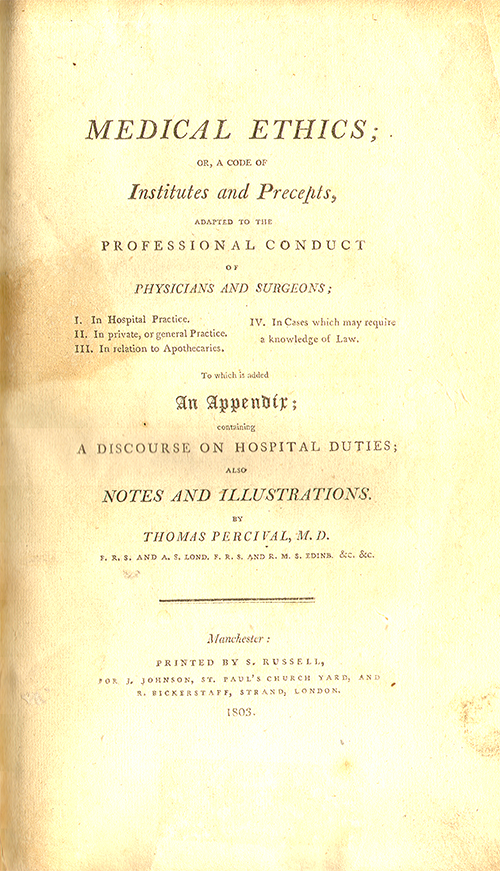Medical ethics; or, a code of institutes and precepts, adapted to the professional conduct of physicians and surgeons. Manchester: printed by S. Russell for J. Johnson and R. Bickerstaff, 1803.
 Thomas Percival was orphaned at age three and raised by his older sister. Their uncle was a physician, and his wonderful library of medical books sparked young Percival’s interest in medicine, as well as ethics. In grammar school, his fascination with ethics was further encouraged by the school rector. From there, he attended the Edinburgh medical school, and completed his M.D. at Leyden. Not long after this, he set up practice in Manchester, a boom town in the eighteenth century as it was becoming England’s major industrial city. But Manchester was also experiencing the worst aspects of industrialization — overcrowding, poverty, environmental problems. Percival, a physician with ethical interests, became devoted to health reform and charity in this growing city (Pellegrino 11-14).
Thomas Percival was orphaned at age three and raised by his older sister. Their uncle was a physician, and his wonderful library of medical books sparked young Percival’s interest in medicine, as well as ethics. In grammar school, his fascination with ethics was further encouraged by the school rector. From there, he attended the Edinburgh medical school, and completed his M.D. at Leyden. Not long after this, he set up practice in Manchester, a boom town in the eighteenth century as it was becoming England’s major industrial city. But Manchester was also experiencing the worst aspects of industrialization — overcrowding, poverty, environmental problems. Percival, a physician with ethical interests, became devoted to health reform and charity in this growing city (Pellegrino 11-14).
The events that lead up to Thomas Percival’s publication of Medical ethics are of particular interest because they demonstrate the respect he held amongst his colleagues. In 1789, the Manchester Infirmary was swamped by patients with typhus and typhoid. Its board of trustees decided to double the staff size to ameliorate the problem. The established doctors, instead of appreciating the reduced work load, thought this to be an insult to their capabilities and resigned as a group. As a result, the community’s physicians were divided, and by late 1791 or early 1792, Percival, known for his moral nature and devotion to ethical causes, was asked by the infirmary to write a code of conduct that would help resolve the dispute. The resulting work, finished in 1794, is entitled Medical jurisprudence. Originally printed for private use, it was distributed to important medical personages, many of whom later encouraged Percival to publish it for the larger medical community. After a decade of further deliberation and consultation with colleagues, Percival published Medical ethics in 1803. The four chapters of the book present guidelines for conduct in hospital practice, private or general practice, in dealing with apothecaries, and concerning legal matters (Pellegrino 7-8). The Reynolds-Finley Library holds a first edition of this lasting work that has been adopted by both the British and American medical professions (Garrison & Morton 1764). The American Medical Association adopted Percival’s Code at their first meeting in 1847. Though major revisions in this code were made by the AMA in 1903, 1912, 1947 and 1994 for clarification or to adapt to changing times, the concepts and much of Percival’s wording still remain (American Medical Association).
American Medical Association, Garrison & Morton, Med. Bib., 5th Edition, 1764; Pellegrino, “Thomas Percival’s Ethics…” Introd. to Medical ethics, Classics of Med. Lib. Spec. Ed., pp. 7-8, 11-14.
Image: Title page from Percival's Medical ethics (1803), Reynolds-Finley Historical Library.
